- Home
- Franklin Horton
Switched On: Book Six in The Borrowed World Series Page 3
Switched On: Book Six in The Borrowed World Series Read online
Page 3
“You could feel it?”
Jim took a deep breath. “I told you it sounded crazy. This guy was asking me to go check on his wife Rosa. It wasn’t in my ears. It was in my head.”
“With all the shit we’ve been through in the past six or seven months, you’re going to tell me you think that sounds crazy? If you told me a year ago that the country was going to get knocked on its ass, I would have told you that was crazy. If you told me a year ago that we’d be living without power now, I would have told you that was crazy. If you told me a year ago I would walk all the freaking way home from Richmond, I would have damn sure told you that you were crazy. Everything that’s happening around us is crazy. So when you tell me that you feel like a dead friend wants you to check on his wife, that just doesn’t even meet the standard of crazy anymore. In fact, it’s probably the most reasonable thing I’ve heard in a while.”
“You have a point,” Jim said. “Either way, I can’t imagine she’s survived. She’s old and in poor health.”
"Well that's a positive fucking attitude," Randi quipped.
"Just being realistic."
Randi shook her head. "You know, Jim, your people skills are sorely lacking. You need a lot of work in that department. A little positivity, a little sensitivity, would go a long way."
"Now you're starting to sound like my family.”
“Maybe they have a point. If you can listen to a dead guy, maybe you should think about listening to the live folks around you.”
Randi was wearing her lecturing face. Jim could imagine it was the one she used when delivering tough love to her kids. She’d even used it on him a few times.
Jim turned around and kept walking toward his shop. “Everybody has some opinion on something I need to improve,” Jim growled over his shoulder. “I’m about to the point of not giving a shit anymore.”
“Oh, quit pouting.”
“I’m not pouting. I’m just embracing my inner curmudgeon. I’m owning it.”
“There’s better things to own.”
“There’s better things to talk about too. Like the power coming back on,” Jim said.
Randi stopped in her tracks. “Excuse me?”
Jim stopped and faced Randi again. “Did you not catch Hugh on the radio? The way he got bombarded, I assumed everyone must have heard it.”
“The power is coming back on? When?” She was practically salivating.
“We don’t know exactly. Hugh says the government is playing some kind of recorded message on a lot of different channels saying that power restoration begins next week.”
“Next week?” Randi’s eyes were wide and she seemed on the verge of breaking into dance.
“Begins next week,” Jim repeated. “That doesn’t mean that we will have power here in this valley next week. In fact, I don’t know exactly what it does mean but it sounds like they’ll start powering things back up next week. That’s why we saw those lights flickering this winter. It had to be them testing the lines.”
Randi took a deep breath. “That’s a lot to think about. What will that be like? What about all the dead people? What about having a job again? What about insurance? Are they going to be fixing peoples’ houses?”
Jim shook his head. “One thing at a time. How about we walk up to Buddy’s house and see if he wants to go with us tomorrow? I’m tired of your lectures about what I need to be working on to make myself a better person. I’m sure you’re missing Lloyd, anyway.”
"Whatever, asshole. You need all the constructive criticism you can get. You should take it and run with it."
“I need to grab my pack if we’re going up the road,” Jim said. “Feel free to keep talking while I’m gone. It will have the same effect.”
Randi scowled and started to give Jim the finger but she was afraid Ariel might be watching out the window. Ariel would tell on her for sure. She was at that age where she loved to rat out the adults.
Jim trotted toward the house, climbed the steps, and stomped the snow off his boots. He went through the front door, careful to stay on the rug so he wouldn’t track snow any further into the house. He grabbed his go bag from a hook by the door.
"Going somewhere?" Ariel said. Jim smiled at his daughter. "Randi showed up to check on her horses. We’re walking up to Buddy's house. I’m going to see if Buddy wants to go into town with me tomorrow. I should be back before too long."
"Don't drink any of Lloyd’s liquid jelly," Ariel said with the smugness and sarcasm that only a pre-teen girl possesses.
"Liquid jelly?" Ellen asked, frowning at her daughter.
Ariel nodded. "That's what Lloyd told me he keeps in those jars. They’re different flavored jellies. They’re just liquidy because they’re not in the refrigerator. He said because of that you have to drink them instead of putting them on biscuits."
"Don't be listening to anything that Lloyd says about that," Ellen said. "He's full of liquid jelly, especially between his ears."
Ariel laughed.
Jim tossed a hand up. "I’ll see you later. Don’t let the fire burn out.”
“I’m on it,” Pops said.
Jim slipped out the door with his armload of gear and headed back across the yard. He found Randi sitting in the barn ruminating on something. Jim didn't ask her what it was. Everyone had a lot of dark thoughts to process these days and needed time to do so. It didn't necessarily mean you wanted to talk about them. He knew that if she reached that point, she’d come out with it.
"Ready to go?" he asked.
She rose stiffly from the chair, finding that the layers she was wrapped in didn’t provide a lot of flexibility.
“You need help, Grandma?”
“Bite my ass,” she growled. “I’m fine.”
“And you said I didn’t have people skills.”
UNFORTUNATELY THERE WAS no shoveled path from Jim's house to Buddy's. Jim and Randi traipsed down his driveway and went through a red tube gate to access the paved road that ran the length of the valley. There they found some tracks—horse, man, dog, and deer.
There were no vehicle tracks. Usable gasoline was almost entirely gone from the valley now. There may still have been caches out there remaining in undiscovered outbuildings, vehicle tanks, and lawnmowers, but they weren’t turning up often. Without the addition of fuel stabilizer, most of what remained was turning to a useless shellac. While Jim and his group still had a little diesel and home heating oil, they were trying to be extremely conservative. They had no means to replace what they used and there were no signs fuel would be in production again anytime soon.
“This snow reminds me of being a kid," Jim said. "They didn’t plow the roads until the snow stopped falling. Four-wheel-drive was less common then and families didn't have six vehicles like they do now. On a snowy night there wouldn’t be anyone out. People stayed home because they had better sense.”
“I’m about your age,” Randi said. “I remember. Different high school but the same county.”
“I remember this one time when I was a teenager,” Jim continued. “I was staying with a friend in town. There was a deep snow like this and we went out walking around. There was nobody anywhere. We sat in the snow underneath the red light in the middle of town and just shot the shit. We must have sat there for an hour and we never saw a car. Those were the good old days."
“So this walk ain’t recapturing the magic of your golden years?” Randi asked.
Jim shook his head. “Not quite.”
"Maybe those were the good old days because you knew you still had power at your house,” Randi suggested. “That’s where the freedom to do things like sitting in the snow in the middle of town came from. You do something like that now you would need someone with a gun watching your back. You might get shot in the head for your warm clothes. And these days you wouldn’t be going back to a house for a cup of hot chocolate or a bag of barbecue corn chips."
"Shit!” Jim groaned. “I wish you hadn’t mentioned those. I haven’t thoug
ht about those things in forever but God I loved them. I would probably shoot someone right now for a bag of them."
“You probably would, being the cold-hearted bastard you are, but let's not get started on the things we miss. If we do, shit is going to get real sad real fast.”
In the deep snow each step was a post hole. They had to raise their legs high, moving slowly and burning lots of energy. Conversation died off, the focus moving to just making progress. What was normally a ten minute walk took about thirty, but eventually they were tromping up the steps to Buddy's porch. The gray painted planks were clear of snow. Jim went over by the front door and leaned against the wall, unlacing his boots.
"You think Lloyd cleared this porch?" he asked.
Randi laughed. Clearly she had her doubts.
There was no need to knock. As the pair took off their shoes they could already hear someone walking toward the door. Buddy opened the door, a lever-action hunting rifle in his hands. Through the open door, Jim could hear strains of banjo music.
"Aren’t you tired of that racket yet?" Jim asked.
Buddy shrugged. “Beats listening to my old joints creak."
Jim shook his head in disagreement. "If you say so."
Buddy held open the door while Jim and Randi slipped inside. Buddy kept the house superheated, like a lot of older people. The living room was probably close to 80°. Jim started to shed layers soon as he was in the house.
Lloyd stopped playing and looked at his oldest friend.
“You know how you can tell if the stage is level at a bluegrass show?” Jim asked.
“No,” Lloyd replied cautiously.
“The banjo player drools out both sides of his mouth.”
Lloyd slapped his knee and snorted with fake laughter.
“I thought I’d get the important things out of the way first. Insulting the banjo player,” Jim said. “So what’s this you told Ariel about drinking liquid jelly?”
Lloyd look sheepish. "She heard me say something about drinking blackberries from a jar. It was all I could think of on short notice."
"And with limited sobriety," Randi added.
"And then there's that," Lloyd agreed.
"So what brings you all out in this weather?" Buddy asked. "Everything okay?"
"Things are fine enough," Jim said. "But I was thinking about going into town tomorrow to check on the wife of a friend. Wondered if you might be interested in going."
Buddy nodded seriously. “I would. Appreciate the offer. What brought this on?”
“Just a feeling,” Jim said, not ready to get into the story again.
"Well, count me out," Lloyd grumbled. “I’m tending the fire.”
"Nobody ever counted you in,” Jim said.
"We walking?” Buddy asked.
"Horses," Jim said. "I’ve still got a little fuel in my truck but I’m not sure I could cross the river in this mess and get up that bank on the other side, even with chains."
"Horses?” Lloyd snorted. “I definitely ain’t going.”
"I already told you that you weren’t invited,” Jim pointed out.
“Just us?” Buddy asked.
"I thought about asking the sheriff," Jim said. “Didn't know if he might need a break or if he might want to see what was going on in town.”
Buddy twisted his mouth and shrugged. "I talked to him yesterday. Saw him outside carrying wood and went over there. I think they’re on a death vigil for his mother. She's not eating or drinking. Her kidneys aren’t working and she hasn’t woke up in days. They’re pretty sure this is the end but she just won’t give in to it."
Jim nodded. "I'll leave them alone then. I may ask Deputy Ford instead." He took a seat on the couch.
Randi spotted a jar of moonshine on the mantle and opened it. She took a deep whiff from the open lid. “Hmmmm…blackberry jelly.”
“Smartass,” Lloyd said.
Randi took a sip and offered it to Jim. Jim had one also.
"Just help yourself, why don't you,” Lloyd said with mock offense.
"Planned on it,” Jim said.
"Guess I’ll have one,” Lloyd said. “I hate to see a man drink alone.”
“Randi is drinking too,” Jim said.
“I hate to see two people drinking alone,” Lloyd corrected.
"What you mean is you hate to see people drinking booze without you,” Jim said.
"Same thing," Lloyd said. “Manners are manners.”
“So did you hear Hugh’s transmission on the radio?” Jim asked, looking from Lloyd to Buddy.
“I caught some of it,” Buddy said. “There was a lot of chattering and I couldn’t make it all out. Sounded like there was news about the power?”
Jim repeated everything he’d heard from Hugh. Buddy and Lloyd nodded, taking it in but not displaying the same excitement that Randi or Jim’s family had demonstrated.
Randi leaned over and punched Lloyd on the arm. “Didn’t you hear what he said? The power will be back on soon? That’s good news.”
Lloyd regarded her, cradling his banjo. “I heard him but I don’t share the opinion that it’s good news. I prefer the world a little more natural. A little darker.”
“Well you can sit in the damn dark then,” Randi said. “I, for one, am ecstatic. What about you, Buddy?”
The old man shrugged noncommittally from his seat at the kitchen table. “Things won’t go back to the same. They can’t. Too much has happened. I don’t know how they’ll fix it.”
Everyone understood that Buddy was right to some extent. They talked about it until the sun dropped to the shoulder of the distant mountains. Jim and Randi rose to pull their layers back on and return to their crowded houses.
They planned a departure time of 8 AM the next morning. Buddy said he would trek up to the deputy’s trailer before it got fully dark and see if Ford was interested in going with them. To no one’s surprise, Lloyd reaffirmed that he would make certain the fire did not go out while they were gone to town.
3
Rosa Fairlane awoke to a completely silent house. Quiet was not unusual or off-putting to her. For the twenty-five or so years since her husband died, the house always seemed quiet. Despite the passage of time, he was still what she listened for each morning. Him in the kitchen fixing a cup of coffee, building a fire, puttering around his office, or his footsteps just moving through the big house.
She did not even notice the absence of modern sounds like cars, television, and the hum of appliances. She had been born into a world without those things and it seemed fitting to her that here toward what was most certainly the end of her life she should find herself again in a world without those things. It was almost as if the electronic age had merely been a noisy blip in the middle of her life.
She threw back the covers and managed to swing her stiff legs from the tall bed. Out of habit and ritual her feet automatically found the fuzzy house slippers she always wore. Oddly enough, in this time of deprivation and want, those were one thing that she had no concern about running out of. When you reached her age no one knew what to give you as a gift so all you ever got were nightgowns, robes, and slippers.
She and her husband always lived on one level of the house. There were two bedrooms and a bathroom upstairs but she hadn’t been up there in years. One of the bedrooms had belonged to her son. He lived in California now and she didn't think she'd ever see him again. He had not come back home to visit often but she understood. He was busy and his personality was such that he had found it easy to cut himself free of the mooring of family.
The other bedroom was perpetually that of a teenager of the 1960s. There was a white portable record player on a table with a 45 rpm record on the turntable. It was the Guess Who. There was a poster of The Doors and one of Jim Morrison solo. Another poster featured signs of the zodiac. There were beaded curtains at the window and a flowered bedspread that her daughter had picked out from the Sears catalog. A blue hairbrush on a mirrored tray held strands of hair that R
osa had stroked hundreds if not thousands of times, her eyes closed, her memory placing the warmth of a child’s head beneath those strands.
Rosa knew the room by memory but could not even recall the last time she went in there. Ten years? Twenty years? It belonged to her daughter Pat. Her daughter had been seventeen when she drowned on a canoe trip on the Clinch River.
It was a hot summer day and there were several canoes full of teenagers, all part of the church youth group. Capsizing a canoe on the slow moving river would not have been a big deal had Pat’s legs not become entangled in a submerged tree. The powerful river had folded her over at the waist, submerging her head. She could not disentangle herself nor could she straighten out to get her head back above water.
It was several minutes before enough people got to her that they could free her legs. They were also fighting the current and the underwater entanglements. When her limp body was finally freed, her spirit was no longer in there. She was gone.
It was 1969. There were no cell phones and no med flights. At that time, in that place, the drowned were dead forever. There was no resuscitation and lingering hope. Part of Rosa died that day too, but Charles would not let her go fully with her daughter. He tethered her to this word and made her continue living.
Charles had already owned this house when she married him. He was a resourceful school teacher and bought a hulking brick Victorian on the edge of town that was falling into disrepair, making it his own over the years. He always had his eye out for interesting architectural features or found materials that were available for free or cheap. Their entry foyer was made of the dark walnut paneling from an old attorney's office. The living room had the hand-planed wainscoting of a church that was being torn down. The mantles came from a colonial-era mansion that was repurposed as a hay barn.
When a modest pioneer home was being torn down to make way for a grocery store, it bothered Charles deeply. The home was one of the oldest on Main Street. He got permission from the property-owner to salvage what he could but he was only given a weekend over which to do so. Charles hired several strong-backed farm boys for a day and they helped him remove several trailer loads of hand-hewn logs and beams. He was always hiring students and former students to help him with jobs. He found he much preferred to work with younger folks. Over time, Charles found a way to integrate those logs into the boring Victorian kitchen, giving it a totally unique pioneer charm.

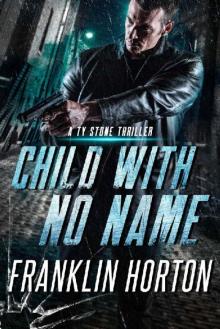 Child With No Name
Child With No Name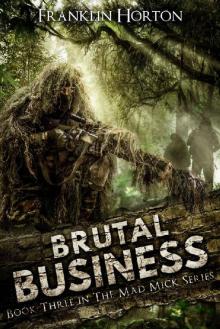 Brutal Business: Book Three in the Mad Mick Series
Brutal Business: Book Three in the Mad Mick Series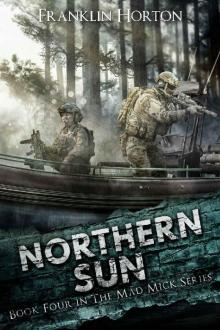 Northern Sun: Book Four in The Mad Mick Series
Northern Sun: Book Four in The Mad Mick Series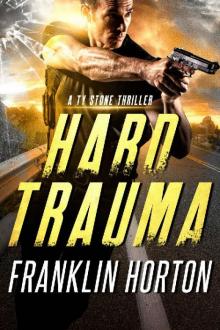 Hard Trauma
Hard Trauma The Mad Mick: Book One of The Mad Mick Series
The Mad Mick: Book One of The Mad Mick Series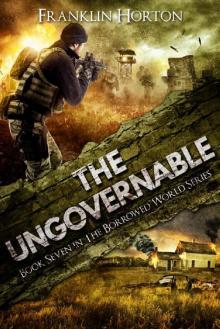 The Ungovernable
The Ungovernable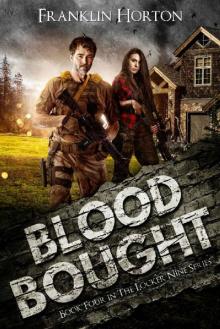 Blood Bought: Book Four in The Locker Nine Series
Blood Bought: Book Four in The Locker Nine Series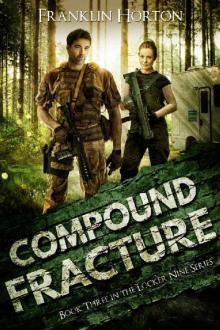 Compound Fracture
Compound Fracture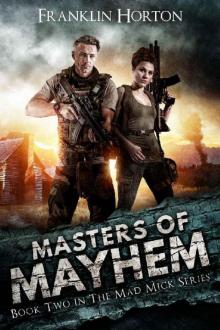 Masters of Mayhem
Masters of Mayhem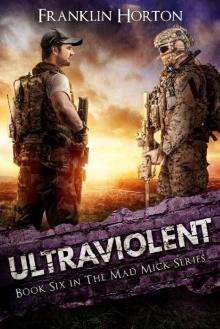 Ultraviolent: Book Six in The Mad Mick Series
Ultraviolent: Book Six in The Mad Mick Series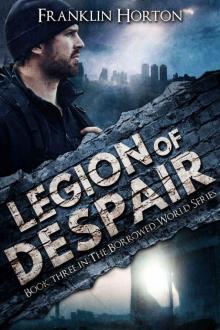 The Borrowed World (Book 3): Legion of Despair
The Borrowed World (Book 3): Legion of Despair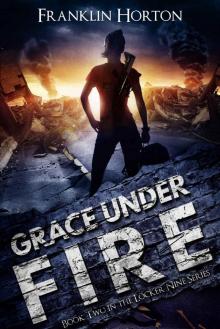 Grace Under Fire: Book Two In The Locker Nine Series
Grace Under Fire: Book Two In The Locker Nine Series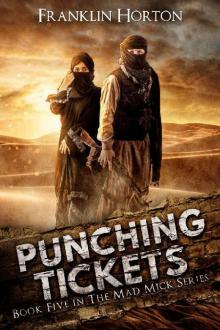 Punching Tickets: Book Five in The Mad Mick Series
Punching Tickets: Book Five in The Mad Mick Series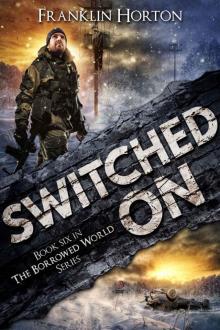 Switched On: Book Six in The Borrowed World Series
Switched On: Book Six in The Borrowed World Series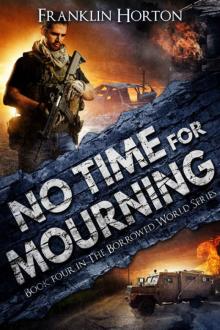 No Time For Mourning: Book Four in The Borrowed World Series
No Time For Mourning: Book Four in The Borrowed World Series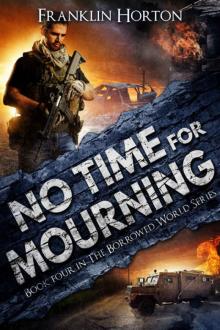 The Borrowed World (Book 4): No Time For Mourning
The Borrowed World (Book 4): No Time For Mourning Random Acts
Random Acts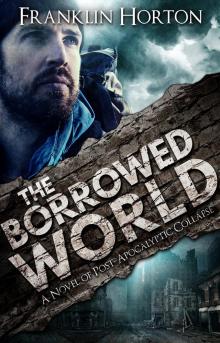 The Borrowed World: A Novel of Post-Apocalyptic Collapse
The Borrowed World: A Novel of Post-Apocalyptic Collapse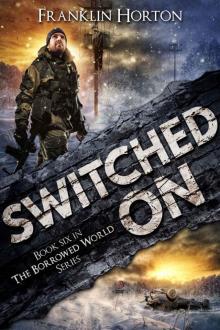 Switched On
Switched On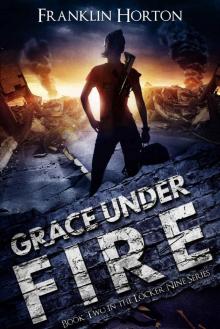 Grace Under Fire
Grace Under Fire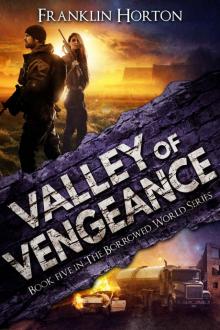 Valley of Vengeance: Book Five in The Borrowed World Series
Valley of Vengeance: Book Five in The Borrowed World Series